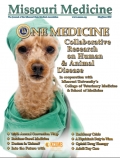The MU Metagenomics Center recently launched a new website – please visit us at:
http://mumc.missouri.edu
Watch the video!

Please visit
MU METAGENOMICS CENTER (MUMC)

SCIENCE OF MEDICINE
One Medicine: Collaborative Research on Human & Animal Disease for the Betterment of Both
Craig L. Franklin, DVM, PhD .......... 195
A Brief History of Animal Modeling
Aaron C. Ericsson, DVM, PhD, Marcus J. Crim, DVM & Craig L. Franklin, DVM, PhD .......... 201
New York Times Article Misleads on the Value of Mouse Models
Catherine E. Hagan, DVM, PhD .......... 206
The Mighty Mouse: The Impact of Rodents on Advances in Biomedical Research
Elizabeth C. Bryda, PhD .......... 207
The Laboratory Animal Veterinarian: More than just a Mouse Doctor
Cynthia G. Alvarado, DVM & Lonny M. Dixon, DVM .......... 223
Resuscitation and rederivation procedures are performed in pathogen-free barrier facility, and clean surrogate mothers purchased from commercial vendor are used for embryo transfers. You will receive the litters with confirmed genetics and pathogen-free health status.
|
Rederivation to pathogen-free status via embryo transfer |
Contact for Quote |
|
